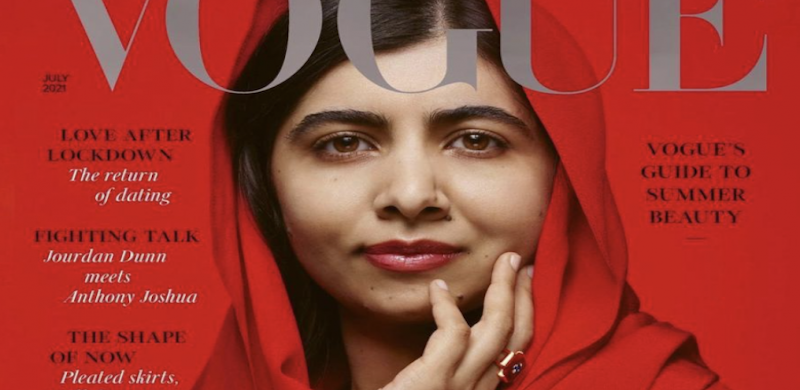
British magazine Vogue announced on Tuesday that its July 2021 cover will feature Nobel laureate girls rights activist Malala Yousufzai. A photo of the cover of the upcoming issue was shared by the magazine in which Malala is seen in a red Stella McCartney dress. The cover says, "The extraordinary life of Malala. Survivor, activist, legend" which is written at the bottom.
British fashion photographer Nick Knight photographed Malala for the occasion. On the inside of the magazine is Sirin Kale's interview with Malala.
British Vogue Editor-in-Chief Edward Enninful shared a long note on Instagram. He said that the interview will bring forth a new side to Malala.
"When it comes to people I admire, Malala Yousafzai is right at the top," he wrote.
"At 23, the world’s most famous university graduate has already lived so many lives. Activist, author, tireless campaigner for girls’ education, daughter, sister, student and survivor," he said.
Among other things, Malala spoke about the significance of head scarf.
I wear it more when I’m outside and in public,” she says, seated at a quiet table, her discreet security detail sitting nearby. “At home, it’s fine. If I’m with friends, it’s fine.” The headscarf, she explains, is about more than her Muslim faith. “It’s a cultural symbol for us Pashtuns, so it represents where I come from. And Muslim girls or Pashtun girls or Pakistani girls, when we follow our traditional dress, we’re considered to be oppressed, or voiceless, or living under patriarchy. I want to tell everyone that you can have your own voice within your culture, and you can have equality in your culture.”
British fashion photographer Nick Knight photographed Malala for the occasion. On the inside of the magazine is Sirin Kale's interview with Malala.
British Vogue Editor-in-Chief Edward Enninful shared a long note on Instagram. He said that the interview will bring forth a new side to Malala.
"When it comes to people I admire, Malala Yousafzai is right at the top," he wrote.
"At 23, the world’s most famous university graduate has already lived so many lives. Activist, author, tireless campaigner for girls’ education, daughter, sister, student and survivor," he said.
Among other things, Malala spoke about the significance of head scarf.
I wear it more when I’m outside and in public,” she says, seated at a quiet table, her discreet security detail sitting nearby. “At home, it’s fine. If I’m with friends, it’s fine.” The headscarf, she explains, is about more than her Muslim faith. “It’s a cultural symbol for us Pashtuns, so it represents where I come from. And Muslim girls or Pashtun girls or Pakistani girls, when we follow our traditional dress, we’re considered to be oppressed, or voiceless, or living under patriarchy. I want to tell everyone that you can have your own voice within your culture, and you can have equality in your culture.”
